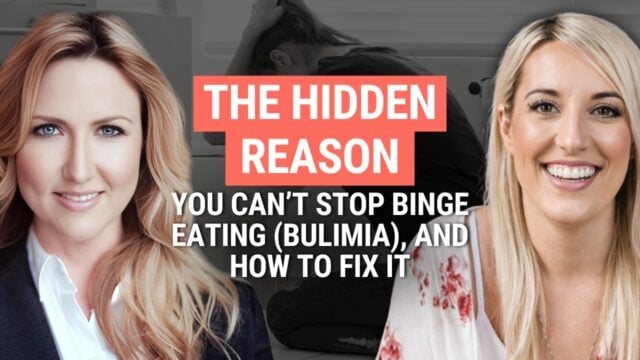Often this time of year your health routine may hit the back burner. And who could blame you? With all the to-do’s, decorating, gift-buying, planning, and traveling it’s no wonder this time of year throws most people off track.
There’s a good reason that most people have “lose weight” on their list of New Year’s resolutions — but that doesn’t have to be you this year.
Getting ahead of the stress and overindulgence that comes with the holidays can stop weight gain in its tracks, and help you enjoy the season while feeling grounded and healthy.
While it may seem like holiday weight gain is inevitable, there are some simple tools and tricks that you can employ to keep the scale steady this year.
In this article, you’ll learn:
- How to fire up your metabolism with one crucial food group
- Why sugar keeps you trapped in a weight-gain cycle
- What to fill your plate and cup with to keep the pounds off
- Why dissolving shame around food is vital to weight loss and maintenance
8 Tips To Recover From Holiday Weight Gain and Overindulgence
#1 Try Intermittent Fasting
Intermittent fasting (IF) offers a quick way to help you get back on track. If you feel like your digestion could use a break, skipping a meal or two may be just what you need.
However, it is important to distinguish that there is a difference between depriving yourself of food, or trying to “make up” for overeating, and doing an intentional fast.
With IF you are strategically planning windows of time where you will go without food. This is not meant to be a punishment but rather a way to help your digestion and metabolism reset.
IF can be especially helpful if you’re trying to kick cravings and shed a few pounds. Some research even shows that it can help reduce cholesterol and triglycerides and potentially lower your risk for diabetes and cardiovascular disease[1][2][3].
Furthermore, following an IF protocol can increase something called autophagy, which is the natural cleaning out and recycling of old or damaged cell parts. By eliminating these unnecessary factors, autophagy is said to increase lifespan and reduce the risk of several diseases[4].
#2 Eat More Veggies
It may seem obvious, but filling up on veggies is a great way to get yourself back on track. Again, this isn’t about punishing yourself for a little overindulgence, it’s about adding nutrients to your diet that will satisfy you on a cellular level.
One day of eating or even a week of overindulgence isn’t enough to warrant an entire diet overhaul. Therefore, making some small tweaks to your diet (like adding more vegetables for a week or two) can more than make up for your holiday indiscretions.
Vegetables are also rich in fiber, which not only helps to fill you up but assists in digestion as well[5][6].
In general, your goal should be to fill half your plate (or bowl) with vegetables, and the rest can be your fat and protein. For the weeks following a holiday splurge, however, try increasing your veggies even more to ¾ of your plate or switch out a starch for a green leafy.
Some great ways to sneak veggies in include:
- Adding extra spinach or tomatoes to your omelet
- Switching from a sandwich to a soup or salad
- Sneaking some leafy greens into your morning smoothie
- Switch out your grains for cauliflower rice
#3 Up Your Protein
After a little overindulgence, it’s common to have a few days of sugar cravings as you slowly find your way off the blood sugar roller coaster. The best way to get ahead of an insatiable appetite during this time is to make sure you get enough protein throughout the day.
Research shows that protein is the most satiating macronutrient. When you consume protein regularly, it keeps your hunger hormones in check and typically results in a reduction of overall caloric intake.
What’s more, because protein is such a complex molecule, it takes more energy for your body to break it down. This is referred to as the “thermic effect” of food. What this means in practical terms is that when you consume protein, you actually burn more calories trying to break it down than when you consume fat and carbohydrates[7].
Always remember with protein, that quality is of the utmost importance. Since protein sources are often animal-derived, it’s crucial to make sure that you’re buying the highest quality available to you. Grass-fed beef, free-range chickens, and wild seafood should be your go-to’s if possible.
#4 Drink Digestive Tea
Drinking a nice cup of tea can be a fantastic way to unwind and relax. The warming and soothing nature of herbal teas can represent a lovely act of self-love — which may be exactly what you need coming off of the holidays.
Perhaps even more important, however, is the medicinal properties that teas offer.
Many teas are rich in antioxidants and other bioactive compounds that promote detoxification, and there are a handful of herbal teas that also support digestion.
For instance:
- Ginger tea is one of the best options if you’re feeling digestive upset. It helps to stimulate stomach contractions to move things along and therefore promotes gastric emptying. This is why many doctors recommend ginger tea for women with morning sickness[8].
- Fennel tea has a laxative effect and helps to relieve constipation. This is a great option if you’ve found that the holidays have thrown your schedule off track and you’re not having bowel movements as frequently, or they aren’t as healthy[9].
- Dandelion tea assists in moving food from your stomach to your small intestine while also supporting your detoxification processes. If you feel like you really overdid it with not just the food but the alcohol as well, dandelion tea is an excellent choice[10]
#5 Skip The Sugar
The holidays are a time where even the most disciplined of us tend to overdo it with sugar. How could you help yourself? It’s everywhere.
The problem with sugar is not so much the acute impact that it has on weight gain or energy, but the potential long-term sugar rollercoaster that it can initiate.
Research shows that sugar is physically addicting, with some studies showing that it may be just as addicting as cocaine. While sugar addiction doesn’t affect everyone, there are few people that don’t struggle at least a little bit to get off of sugar once your taste buds get accustomed to it[11].
Furthermore, when you overindulge, you don’t just pack on weight from fat, but also from stored water. Cutting back on sugar, and carbs, in general, can lead to some water loss. While traditionally, this is seen as smoke and mirrors for weight loss, in the case of overindulgence, it may help you get back to homeostasis and reduce some of the bloat that comes with excessive sugar intake[12].
If you can manage, try to avoid sugar altogether. After a few days without sugar, foods like fruit will taste much sweeter, and you won’t have to deal with the ups and downs of blood sugar.
#6 Avoid Alcohol
Overindulging with food and overindulging with alcohol often go hand in hand. Although it may have been just what you needed to get through the holidays, if you want to get back on track, alcohol should be the first thing to go.
When you drink alcohol, it actually interrupts your digestive process. If your goal is to cleanse and maybe drop a few pounds, then having strong digestion is crucial[13].
Alcohol also stimulates inflammation and can have a harmful impact on your immunity, gut, and brain. What’s more, when you drink, it can lower your inhibitions, and all your food intentions for getting back on track will go out the window[14].
Clearly, if you want to feel your best, alcohol has to go.
#7 Get Moving
There’s no trick for getting back on track that works quite as well as movement.
Exercise will clear your mind, burn calories, get things moving, improve your mood, support better sleep, and help your body manage blood sugar, which can reduce cravings[15].
The good news is, you don’t have to be a marathon runner to experience these amazing benefits. Research shows that just 150 minutes (2 and a half hours) of moderate-intensity exercise a week is all you need. That’s just 30 minutes a day 5 days a week.
Some great ways to get moving include[16]:
- Brisk walking
- Jogging
- Swimming
- Yoga
- Biking
- Pilates
- Resistance training (lifting weight, using exercise bands, or bodyweight exercises)
#8 Don’t Be Hard On Yourself
Last but definitely not least, one of the most productive things you can do to combat holiday overindulgence is to be kind to yourself. Judgment or harsh criticism of yourself is a sure-fire way to keep your energy low and put unnecessary stress on yourself.
Research shows that shame is one of the most common underlying factors that lead people to binge eat. If you feel judgment or shame after the holidays, you are only making matters worse for yourself[17].
Instead, try some loving compassion. Self-compassion teaches you to accept what is and give yourself a break for being human. If overindulging during the holidays was such a shameful act, would so many people do it? Researchers that study eating disorders have found that when people allow self-compassion, it reduces the risk of disordered eating behavior[18].
The desire to get back on track after an overindulgence should come from a place of love, not self-criticism. If it’s your goal to lose weight, kick the cravings, and get your energy back, your most powerful ally is self-compassion.
Takeaway
A little holiday overindulgence never killed anybody, but if you’re feeling off after the holidays, there’s plenty you can do to find your way back to balance.
If it’s some extra pounds you’d like to shed, intermittent fasting offers an excellent option. Or maybe you just need to get off the sugar rollercoaster by introducing more protein and avoiding added sugars.
Digestive teas and veggies can provide an extra hit of nutrients that your body is likely craving while avoiding alcohol can help you to keep your eye on the prize.
Movement can boost your mood and keep you motivated, while self-compassion is the ace in your pocket.
You can choose to try out a few of these strategies or all of them — whatever works best for you.










